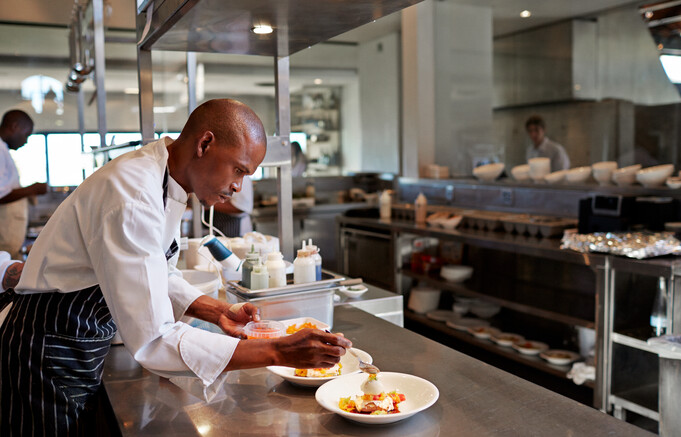Chef education benefits: why formal culinary training is essential for aspiring chefs

If have a passion for food and have been looking at starting a career in the culinary arts, you will have looked at different routes into the field, including how to become a professional chef. There are many different paths you could take during a career as a chef, but it’s always important to get the right training and education. You need to make sure you have the expected skills to easily and quickly feel at home in any professional kitchen, as well as the capabilities and techniques that will help you advance.
In this article, we’ll go over why a formal chef education is vital when you're hoping for success in culinary arts careers. We’ll also discuss the different types of chef training you can choose, as well as how to find the right culinary degree for you, looking at various courses, programs, and requirements.
The importance of chef education
If you want to embark on a chef career, the first step is getting equipped with the right kind of education. Working as a professional chef requires more than just knowing how to cook, and you can get all the skills you need with the right culinary arts qualification. Here are the main benefits of a thorough culinary education.
- Familiarity with a professional kitchen: A restaurant kitchen is a unique environment, and being prepared is invaluable.
- Culinary skills: A culinary arts degree will give you professional culinary skills that go far beyond domestic cooking.
- Career advancement opportunities: A formal education can help you progress more easily. When you look at career goals, for example being a head chef vs executive chef, you'll often find more senior roles require a culinary degree.
- Competitive advantage: The culinary industry can be very competitive, especially when applying for senior job roles. Formal education from a well-respected culinary school can give you an edge over other applicants.
- Knowledge to start your own business: If you dream of opening your own restaurant, a culinary degree can also give you the knowledge and skills you need to strike out on your own.
Types of chef education programs

Maskot/Royalty-free via getty images
There are many ways that you can go about getting your culinary education, all with their own benefits. Some channels for training in the culinary arts include the following.
- Culinary schools: If you want the very best culinary education possible, you could look at attending a culinary school in France. France is famous for the culinary arts, and a degree from a French institution will stand out on your resume.
- Community colleges: Many community colleges offer culinary courses and management education that will support your ambition to become a chef. These will usually be cheaper options to help you get a good basic education in the field, but you will not find many specialized options, such as pastry art degrees.
- Vocational schools: A vocational school will help you acquire many practical skills that will be useful in the culinary field, but you will often not get the same level of theoretical knowledge and management expertise that you would with a culinary degree.
- Apprenticeships: An apprenticeship is a way to learn on the job. This combines education and practical work. However, unlike an internship, you would likely start an apprenticeship at an entry-level or low-level role and work up from there.
Chef education requirements
If you want to become a chef, it's important to know what's expected for different roles. As well as educational qualifications, there are also other prerequisites you will have to consider if you want to work in this field, including the following.
- Educational requirements: You need a well-rounded culinary education that gives you all the skills and knowledge for your career as a chef. Different roles will have different educational requirements, and if you're looking for the highest-level chef roles, you're likely to need advanced qualifications.
- Work experience requirements: Most employers will expect you to have real-world experience in the culinary field. This could be gained through working in entry-level roles in a professional kitchen, such as kitchen assistant or cook roles. You could also get this experience through apprenticeships or internships as part of a culinary arts degree.
- Certifications and licenses: Depending on where you want to work, you might need relevant certificates or licenses, such as certification in food or kitchen safety. If you're looking at culinary entrepreneurship and starting your own restaurant, you'll also need to look at any licensing requirements for this.
What degree do you need to be a chef?
A culinary degree will give you a great platform for becoming a chef, allowing you to aim immediately for higher-level roles. It's possible to become a chef without a degree, but this would mean working your way up from entry-level roles, and you would have to undertake further education while working.
Launch your career with a world-class culinary education
During our Bachelor's degree, you'll acquire deep knowledge of the culinary arts, combined with essential expertise for success as a head or executive chef.
Bachelor degree in culinary arts
What chef education courses teach you

Klaus Vedfelt/ Royalty-free via getty images
During your chef education, you can expect a broad education, including the following areas.
- Cooking techniques and methods: Your gastronomy education should include flavor profiles as well as different practical techniques.
- Culinary history: Including the history of international cuisine and the history of food and beverage service, you'll understand the state of the industry.
- Food safety and sanitation: Food safety is vital and should be taught in every culinary course, including how to handle dietary restrictions and allergies.
- Menu planning and cost control: This will include ingredient sourcing, food sustainability, recipe development, and more.
- Pastry arts and baking: You could specialize in a pastry degree, but most culinary degrees will give you some knowledge of baking and pastry.
- Nutrition and diet: This includes food science and how to properly balance dishes for optimal nutrition.
- Kitchen management skills: This encompasses staff management, scheduling, inventory, and more.
- Equipment use: You will also learn how to properly and safely use all kitchen equipment and tools.
Choosing the right chef education program
You want to make sure that you are selecting the right chef education to match your career goals. Some factors to consider when picking a culinary degree include:
- Location
- Cost
- The reputation of the institution
- The skills you'll learn
- Course duration
Whether the course includes internships
You should consider what you want to achieve with your chef education and pick a course that delivers the skills required. Remember to find a culinary arts program that focuses on both practical experience as well as developing soft skills, such as communication skills, problem solving, and more. You’ll need all of this for your future career path.
Bachelor’s degrees vs diplomas
Depending on your career goals, you might be looking at either a bachelor’s degree or a diploma to help kick-start your career as a chef in the hospitality industry. A bachelor’s degree is typically a 4-year program that will give you a broad range of skills to work at high levels in the food industry. On the other hand, a diploma is a shorter course that can help you if you want to change your career or start your own business with a focus on key skills.
Intensive diploma for career-changers
If you want the skills and experience to move into the culinary field, our diploma studies are ideal, combining practical teaching and hands-on experience.
How much does chef education cost?

Hispanolistic/E+ via getty images
Chef education can vary in price. A full degree at an internationally recognized culinary school may cost thousands of dollars, while a short course at a community college may only cost a few hundred dollars. However, you have to consider how a formal chef education can improve your long-term earning potential.
Can you become a chef without formal education?
You can become a chef without formal education, but you will have to start in entry-level roles and work your way up. Getting a culinary degree can help you skip years of working as a kitchen assistant or sous chef, letting you aim for senior roles straight away.
How long does it take to become a certified chef?
You could complete a culinary diploma in as little as 5 or 6 months, whereas a full culinary degree will usually take 4 years.
Chef education: conclusion
If you think that being a chef is a good career choice, you should consider what a formal chef education and formal training can do for you. There are plenty of ways to get a great chef education, including culinary degrees, diplomas, community college courses, and more. A culinary degree from a leading institution can help you acquire the skills and experience needed to succeed as a head chef or executive chef or prepare you for starting your own business.


